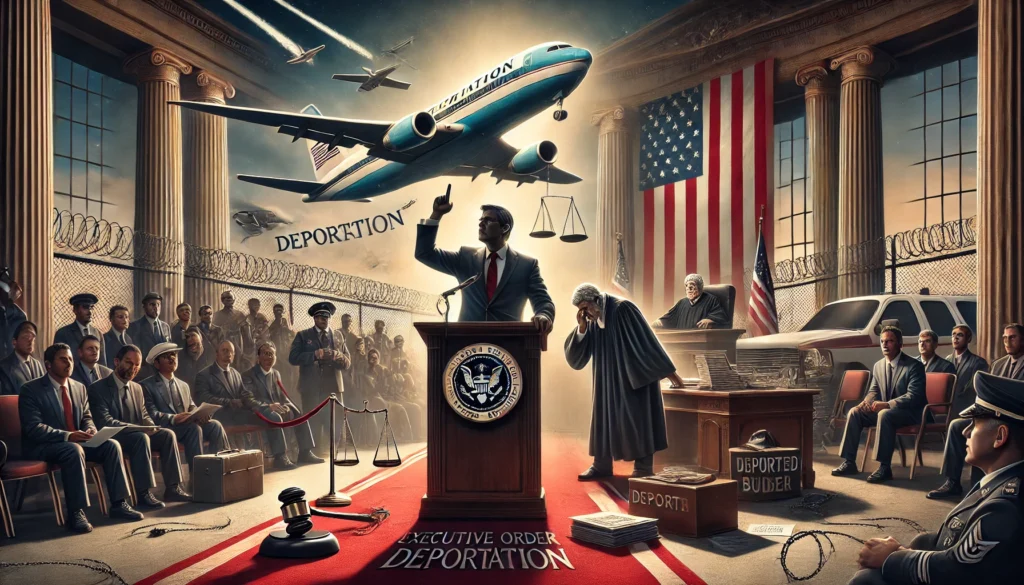Published Date: March 17, 2025 ✍️ Author: Global World Citizen News Team 🌍 Source: GlobalWorldCitizen.com
The Trump administration announced the arrest and deportation of hundreds of alleged members of Venezuela’s Tren de Aragua gang to El Salvador, despite a federal judge’s ruling temporarily blocking some expulsions.
Mass Deportations Under Executive Order
The White House confirmed that President Donald Trump directed the Department of Homeland Security (DHS) to execute the swift removal of nearly 300 individuals suspected of belonging to the violent criminal network.
“This weekend, at the President’s direction, the Department of Homeland Security successfully arrested nearly 300 Tren de Aragua terrorists, saving countless American lives,” White House Press Secretary Karoline Leavitt stated on Sunday. “These heinous criminals were extracted and sent to El Salvador, where they will no longer pose a threat to the American people.”
The U.S. government has struck a deal with El Salvador to detain the deportees in a high-security facility, an arrangement brokered by Secretary of State Marco Rubio and El Salvadoran President Nayib Bukele. According to Bukele, 238 gang members were transferred to a special terrorism confinement center.
Trump Invokes Rarely Used War-Era Law
On Saturday, President Trump invoked the Alien Enemies Act of 1798, a seldom-used statute that allows the president to detain and expel foreign nationals from adversarial nations in wartime. The law was previously cited to justify the internment of Japanese Americans during World War II.
Trump’s move is a legal escalation, as the administration claims that Tren de Aragua members have “unlawfully infiltrated the United States and are conducting irregular warfare and hostile actions.” The proclamation further asserts that the gang’s mass migration into the U.S. is part of a strategy to “undermine public safety” and support Venezuelan President Nicolás Maduro’s alleged efforts to destabilize democratic nations.
However, the administration has not publicly detailed how it identified the deportees as members of Tren de Aragua, raising questions about due process and potential wrongful expulsions.
Court Blocks Deportations, Orders Flights Turned Around
While the Trump administration pushed forward with deportations, U.S. District Judge James Boasberg issued a 14-day injunction, pausing further removals while the court reviews a lawsuit filed by the American Civil Liberties Union (ACLU) and Democracy Forward.
Judge Boasberg ordered that any flights carrying deportees under Trump’s proclamation be turned around midair and returned to the U.S., according to reports from the Associated Press. The ruling came in response to concerns that the executive order may violate constitutional protections and international human rights obligations.
Despite the court’s intervention, the White House maintains that it acted within legal bounds. “The order, which had no lawful basis, was issued after the deportations had already taken place,” Leavitt argued, insisting the administration did not violate the ruling.
When asked whether the administration had defied the judge’s order, Trump replied aboard Air Force One on Sunday:
“I don’t know. You have to speak with the lawyers.”
Legal and Political Fallout
The Venezuelan government swiftly condemned the U.S. action, calling it a “blatant and unjust criminalization” of Venezuelan migrants and likening it to some of history’s darkest moments.
The legal battle underscores Trump’s broader push to ramp up deportations and tighten immigration controls in his second term, fulfilling campaign promises aimed at curbing illegal migration and crime. However, similar to his first term, Trump’s policies face resistance from the judiciary, with multiple courts stepping in to challenge his executive actions.
Legal experts argue that the Alien Enemies Act has historically applied to wartime scenarios involving entire nations, not specific criminal organizations. Opponents claim that deporting individuals based on alleged gang affiliation—without a formal declaration of war against Venezuela—stretches the statute’s original intent beyond its legal boundaries.
In court filings, the Trump administration acknowledged that some deportations occurred before the judge’s ruling but assured the court that no further removals under the proclamation would take place unless the court lifts the restraining order.
At least five individuals who were initially set for removal remain in the U.S. as a result of the injunction, according to government records.
What Happens Next?
The next steps in the legal battle will determine whether Trump’s use of the Alien Enemies Act stands or is overturned in federal court. If the judge upholds the temporary injunction, deportations under the order may be permanently blocked, setting a precedent for future executive actions on immigration.
As legal challenges mount and international scrutiny grows, the Trump administration faces increasing pressure to justify its actions while balancing its hardline immigration stance with compliance to U.S. and international law.

